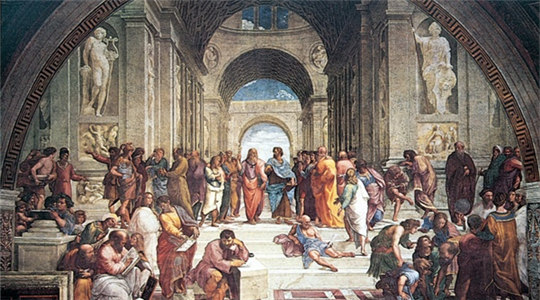
当前课程知识点:Plato, Socrates, and the Birth of Western Philosophy > Seeking “sheng”(圣)——Communion with gods > 1.An explanation to the related words > An explanation to the related words
返回《Plato, Socrates, and the Birth of Western Philosophy》慕课在线视频课程列表
返回《Plato, Socrates, and the Birth of Western Philosophy》慕课在线视频列表
同学们 大家好
今天我给大家讲授本门课程的
第十四讲 求圣
我们知道希腊古代思想家都在求福
追求真正的幸福
也在求圣追求成为圣人
让我们了解他们的精神历程
来领略希腊罗马民族的求圣精神
我先把相关的一些语词做一些解释
首先我们来看神圣这个概念
是怎么一回事
在中文中间
圣字它的意思叫做
汝颍之闲谓致力于地曰圣
这是说文解字中间的解释
在古汉语字典中间
圣字有这么几个意思
第一通达事理
第二具有最高的智慧和道德
第三古时候称具有
最高超技艺的人就是圣人
比如说我们常说诗圣
在中国的诗歌中间
我们知道诗圣指的是李白
在希腊文中间
也有这个圣字
这个希腊文中间的圣字
写作ΣοФιστηs
这个按照英文翻译下来
它就念成sage
这个圣人和圣贤这是我们
对这个希腊文的翻译
我们一看这个希腊原文
我们就知道它和我们前面几讲中间
提到过的那个智者
最聪明的人是同一个词
但是在希腊文中间
它还有另外一个词也有圣的意思
它念作īεροs
英文把它翻译成Sacred
我们一般看到这个词的时候呢
就把它翻译成成圣
成为圣人
我们看到与刚才说的这个īεροs相关的
这么一个词经过一些词形的变化
īερειον这个词的意思呢
就是宗教活动中的献祭
把某些东西比如说一头猪
一头羊还有那些果品
把它奉献给神
那么经过这么一个过程
这些祭品也成了神圣的东西了
Μηνυσιs英文就把它翻译成reveal
这个词我们在宗教学的研究中间
把它译成显圣
或者把它倒过来圣显
这个词同时还有另外一个
我们宗教学中间常用的词
它的意思是启示
第二个我要给大家做解释的词是奥秘
这个词在希腊文中间μυστηρια
它这个词用中文来解释
它就有奥秘引导
介绍一个信徒加入盟会
它还指的是秘密的东西
指的是神圣
或者是指的是放弃肉体的感觉
代之以超验的启示
像这么一些解释呢
那是我们用中文
对这个希腊文做的一些理解
如果说要用一个词来解释它
那我们常用的就是
奥秘这个词
在英汉词典中间
也列举了mysticism一词
这个词的多种含义
我们来看看它的第一个意思
就是指的神秘主义
具体说来它指的就是神秘主义者们
所传说的那个神秘的交融
或者与最高实在直接进行灵交的经验
这么一些解释的话呢
它重在反映那些宗教信徒们的
那种宗教体验
Mysticism这个词的第二个含义
它指的是神秘的教义
任何一种宗教
它都有它的教义
那么这些教义与这些教义有关的知识
它基本上就被我们归到这一类中间去
所以神秘的教义它指的是
关于神秘知识的一种理论
第三种意思叫做玄想冥想
它指的是缺乏基础的一些信念
这种玄想在英文中间
我们可以把它译成speculation
那么这种冥想和我们常说的
理论思考有什么差别呢
理论思考以概念思维为它的前提
而我们这里所说的玄想冥想
它以直觉为先决条件
我们再来看一下
另外一本宗教学词典中间
对神秘或者奥秘这个词的解释
这个词典中间解释的比较清楚
而且它的解释是联系具体的
某种宗教来进行的
第一个意思它指的是
神或者上帝所启示的那个宗教教义
人们在接触这些东西的时候
它不能单凭理智去加以理解
它要经过启示
人们才能有所理解
它的第二个意思就专门指
基督教的礼仪或者圣事
第三它指的是基督教以外的
其它的秘密宗教的仪式
这些仪式的特点是向信徒出示神物
叨念忏语演示仪式
比如洗手吃喝杀牲
这样做的目的是
使信徒们在今生过得更好
并保证让他们死后由于这样的祈祷
能够与他们所崇拜的神同在
这本词典对这个词的
第四解释就是神秘
它指的是那些没有或者
不能被解释的事物
也就是说是大家都不知道的事物
那么大家都不知道的事物
为什么又会被人们
看做是神秘的东西呢
因为这个事物同时
对人有很大的吸引力
它很有趣
因此人们抱着一种好奇心
就努力地去接触它
第三个方面我要给大家
综合地对神秘主义再做一个解释
神秘主义是宗教学家哲学家神学家
社会学家生物学家心理学家
共同关心的一类现象
但究竟什么是神秘主义
各种定义莫衷一是
学者们基于自己的立场
和研究方法各执一词
然而相比而言
神秘主义与宗教的关系最为密切
宗教学的研究频繁地使用这个概念
我们说在现代学术研究中
神秘主义首先是包括宗教心理学
和宗教社会学在内的
宗教学研究的问题
而这些研究的结果对宗教
在现代条件下的生存和发展至关重要
我们来看一下这些专家学者
给出的定义
第一个定义
神秘主义是融修行术与秘传知识
为一体的一门学科
是上升到最高水平的个人宗教
神秘主义可以和宗教有关联
但并非必然如此
神秘主义者往往是宗教团体
并不想培养也不知如何对待的人物
这个定义从学科分类的角度
描述了神秘主义的所指
但是实际上我们看到
至今为止还没有哪一门学科
愿意给自己戴上神秘学的称号
相反倒是那些很难登上科学殿堂
或至今仍在科学的门槛外徘徊的
类科学或者准科学
经常被人们贴上神秘主义的标签
更何况这个定义把某种宗教现象
即我们刚才提到的修行术
定为神秘主义的主要内容
如果按照这个定义去理解神秘主义
就会使我们对神秘主义的研究
局限在宗教的某一个要素之中
在这样的定义下
我们很难看清宗教意识
与宗教体验的关系
更无法弄清宗教神秘主义的发展
我们认为神秘是一种普遍的宗教现象
是与宗教的各个层面
都有关系的一种性质
而不是一个独立的可以作为
科学研究对象的实体
宗教意识宗教礼仪宗教组织
和宗教体验
都有神秘与不神秘之分
学术界在使用神秘主义这个词的时候
更多地也是用作属性判断
而不是用作实体的陈述
当然我们这样说并不意味着
我们反对研究修行术
而是认为修行术是宗教的重要内容
是我们在研究宗教神秘主义的时候
要加以密切关注的
第二个定义与上述定义类似的一类定义
是把神秘主义限定为一种宗教的体验
也就是所谓的神人合一的体验
这一类定义是这么说的
神秘主义是个人与神合一时的
直接的感受
神秘主义是这样一种心灵的态度
在心灵中所有的联系
都被心灵与神的联系所吞没
真正的神秘主义是这样一种意识
我们所经验到的
每一样事物都是一种成分
并且事实上只是一种成分
亦即在存在的本质上
它只是别的事物的符号
这个词条的作者也指出
显然这样的对神秘主义现象
作宗教和哲学解释的定义
不会被所有沉思者所接受
他这里讲的沉思者就是我们刚才
在解释奥秘的时候
的那个speculator
比如不相信一个人格神的
佛教神秘主义者
会排斥这些定义中的前两个
他也会对第三个定义产生怀疑
在什么意义上可以把涅磐的体验
理解为其它别的事物的符号
这个定义我们把它介绍给同学们呢
也是供同学们作参考
这里的要点是它提到了
神人合一的体验
类似的定义还有这么一些
我仍旧想给同学们说一下
神秘主义是一种在现世
通过个人的宗教体验而获得的
关于神的间接的知识
它原来是一种祈祷者的状态
从得到程度不同的各种短暂
而又罕见的神圣的触及
到在所谓的神秘的合一中达到实际的
与神永恒的联合
神秘主义者自己为他们的
体验的真实性
提出的最确定的证明是它的效果
亦即在谦卑仁慈甘愿受苦
这一类事情上的增长
神秘主义是一种广泛的体验
不仅在基督教中间有
而且在其它许多宗教中间也有
神秘主义就是人与神的心灵合一
诸如此类的定义表明
在现代西方宗教学和哲学研究中间
神秘主义主要是被理解为
一种特殊的宗教体验
即人神合一的心灵体验
我认为这样一类定义
或者说这种理解
是一种狭义的神秘主义。
我们从上面这些解释也可以看出
神秘神秘主义以及和这两个词
同源的那些词基本上
是在宗教范围内使用的
它在具体所指的时候
又涉及到宗教的意识宗教的礼仪
宗教的组织等各个层面
我们看到人们在非宗教的意义上
也在使用神秘这个词
但是我们基本上
可以把在非宗教意义上的
神秘这个词可以看作
是我们日常生活中间
常用的秘密那个词的同义词
我在这里举一个例子
同学们可能已经读到过
这么一个广告
这个广告是这么说的
钻石在大自然中经过亿万年的光阴
方才焕发出醉人的华彩
每一颗都是独一无二弥足珍贵的
给人一种神秘莫测的感觉
然而我们要衡量一颗钻石的
价值与品质
那我们就却一点也不神秘
就是在这种世俗的意义上
神秘的意思就等于不了解不懂
或者没有被人们所认识
它就等于我们在日常生活中间
所说的那个秘密
所谓神秘的对象一旦被人们了解了
它也就不再神秘了
当然在这个词的宗教意义中
世俗的我们说的秘密的这个含义
也仍旧保留着
我们可以这么说
一种宗教被人们了解的越多
它就越不神秘
反过来人们对某种宗教越是不了解
也就越觉得它神秘
-1.Etymology
-2.Definition and the History of Philosophy
--Definition and the History of Philosophy
-3.Religion
--Religion
-4.Culture
--Culture
-5.Theory of Cultural Transformation and Interaction: Five theoretical premise
--Theory of Cultural Transformation and Interaction: Five theoretical premise
-6.Theory of Cultural Transformation and Interaction:Five Basic Position
--Theory of Cultural Transformation and Interaction:Five Basic Position
-7.The Significance of Theory of Cultural Transformation and Interaction
--The Significance of Theory of Cultural Transformation and Interaction
-Self-test Exercises
-Thinking Questions
-1.The Birth Environment of the Greek Philosophy(1)
--The Birth Environment of the Greek Philosophy(1)
-2.The Birth Environment of Greek Philosophy(2)
--The Birth Environment of Greek Philosophy(2)
-3.The Stages and Schools of Greek Philosophy(1)
--The Stages and Schools of Greek Philosophy(1)
-4.The Stages and Schools of Greek Philosophy(2)
--The Stages and Schools of Greek Philosophy(2)
-5.The Local Characteristics of Ancient Greek Philosophy and the progress of internationalization(1)
--The Local Characteristics of Ancient Greek Philosophy and the progress of internationalization(1)
-6.The Local Characteristics of Ancient Greek Philosophy and the progress of internationalization(1)
--The Local Characteristics of Ancient Greek Philosophy and the progress of internationalization(1)
-7.The termination of Ancient Greek Philosophy
--The termination of Ancient Greek Philosophy
-Self-test Excercises
-Thinking Questions
-1.A transition to rational thinking(1)
--A transition to rational thinking(1)
-2.A transition to rational thinking(2)
--A transition to rational thinking(2)
-3.A transition to rational thinking(3)
--A transition to rational thinking(3)
-4.A transition to rational thinking(4)
--A transition to rational thinking(4)
-5.Heraclitus’ thinking
-6.Parmenides’ thinking(1)
-7.Parmenides’ thinking(2)
-Self-test Excercises
-Thinking Questions
-1.Seeking the origin:the early philosophers(1)
--Seeking the origin:the early philosophers(1)
-2.Seeking the origin:the early philosophers(2)
--Seeking the origin:the early philosophers(2)
-3.Seeking the essence: Plato’s theory of Form (1)
--Seeking the essence: Plato’s theory of Form (1)
-4.Seeking the essence: Plato’s theory of Form (2)
--Seeking the essence: Plato’s theory of Form (2)
-5.Seeking to on: Aristotle’s ontology and metaphysics (1)
--Seeking to on: Aristotle’s ontology and metaphysics (1)
-6.Seeking to on: Aristotle’s ontology and metaphysics (2)
--Seeking to on: Aristotle’s ontology and metaphysics (2)
-Self-test Excercises
-Thinking Questions
-1.The lexical meaning
-2.Epistemology(1)
-3.Epistemology(2)
-4.Epistemology(3)
-5.Epistemology(4)
-6.The features
-Self-test Excercises
-Thinking Questions
-1.A lexical meaning(1)
-2.A lexical meaning(2)
-3.A lexical meaning(3)
-4.Plato’s Dialectics(authentic true)
--Plato’s Dialectics(authentic true)
-5.Aristotle’s Logics(judging true)(1)
--Aristotle’s Logics(judging true)(1)
-6.Aristotle’s Logics(judging true)(2)
--Aristotle’s Logics(judging true)(2)
-Self-test Excercises
-Thinking Questions
-1.A lexical meaning
-2.The occurrence and development of the ancient Greek Science(1)
--The occurrence and development of the ancient Greek Science(1)
-3.The occurrence and development of the ancient Greek Science(2)
--The occurrence and development of the ancient Greek Science(2)
-4.The occurrence and development of the ancient Greek Science(3)
--The occurrence and development of the ancient Greek Science(3)
-5.The occurrence and development of the ancient Greek Science(4)
--The occurrence and development of the ancient Greek Science(4)
-6.The occurrence and development of the ancient Greek Science(5)
--The occurrence and development of the ancient Greek Science(5)
-7.the technicalization and application of ancient Greek Science(1)
--the technicalization and application of ancient Greek Science(1)
-8.the technicalization and application of ancient Greek Science(2)
--the technicalization and application of ancient Greek Science(2)
-Self-test Excercises
-Thinking Questions
-1.A Lexical meaning
-2.Plato’s theory of Love
-3.The high praise to the love god: a reading on Symposium (1)
--The high praise to the love god: a reading on Symposium (1)
-4.The high praise to the love god: a reading on Symposium (2)
--The high praise to the love god: a reading on Symposium (2)
-5.The high praise to the love god: a reading on Symposium (3)
--The high praise to the love god: a reading on Symposium (3)
-6.The high praise to the love god: a reading on Symposium (4)
--The high praise to the love god: a reading on Symposium (4)
-Self-test Excercises
-Thinking Questions
-1.A lexical analysis
-2.The development of the Classic Greek Ethics(1)
--The development of the Classic Greek Ethics(1)
-3.The development of the Classic Greek Ethics(2)
--The development of the Classic Greek Ethics(2)
-4.The development of the Classic Greek Ethics(3)
--The development of the Classic Greek Ethics(3)
-5.The development of the Classic Greek Ethics(4)
--The development of the Classic Greek Ethics(4)
-6.From the ultimate goodness to the common goodness(1)
--VideoFrom the ultimate goodness to the common goodness(1)
-7.From the ultimate goodness to the common goodness(2)
--From the ultimate goodness to the common goodness(2)
-Self-test Excercises
-Thinking Questions
-1.A lexical meaning
-2.Ancient humanistic trend of thoughts(1)
--Ancient humanistic trend of thoughts(1)
-3.Ancient humanistic trend of thoughts(2)
--Ancient humanistic trend of thoughts(2)
-4.Ancient humanistic trend of thoughts(3)
--Ancient humanistic trend of thoughts(3)
-5.A theoretical summary
-Self-test Excercises
-Thinking Questions
-1.A lexical analysis
-2.The story of Gyges
-3.The Ancient theory of justice(1)
--The Ancient theory of justice(1)
-4.The Ancient theory of justice(2)
--The Ancient theory of justice(2)
-4.The Ancient theory of justice(3)
--The Ancient theory of justice(3)
-Self-test Excercises
-Thinking Questions
-1.An explanation to the related words
--An explanation to the related words
-2.A Platonic Republic
-3.Cicero’s people’s Republic(1)
--Cicero’s people’s Republic(1)
-4.Cicero’s people’s Republic(2)
--Cicero’s people’s Republic(2)
-Self-test Excercises
-Thinking Questions
-1.A lexical analysis
-2.The religious trends in the late period of ancient Greek philosophy(1)
--The religious trends in the late period of ancient Greek philosophy(1)
-3.The religious trends in the late period of ancient Greek philosophy(2)
--The religious trends in the late period of ancient Greek philosophy(2)
-4.The religious trends in the late period of ancient Greek philosophy(3)
--The religious trends in the late period of ancient Greek philosophy(3)
-5.The religious trends in the late period of ancient Greek philosophy(4)
--The religious trends in the late period of ancient Greek philosophy(4)
-6.The collision between faith and reason(1)
--The collision between faith and reason(1)
-7.The collision between faith and reason(2)
--The collision between faith and reason(2)
-Self-test Excercises
-Thinking Questions
-1.An explanation to the related words
--An explanation to the related words
-2.Communion with gods(1)
-3.Communion with gods(2)
-4.Communion with gods(3)
-5.Communion with gods(4)
-6.Plotinus’ mystical system of thoughts
--Plotinus’ mystical system of thoughts
-Self-test Excercises
-Thinking Questions
-1.The local characteristics of the ancient Greek Philosophy
--The local characteristics of the ancient Greek Philosophy
-2.The progressive universalization of the ancient Greek Philosophy
--The progressive universalization of the ancient Greek Philosophy
-3.The basic spirits of the ancient Greek Philosophy(1)
--The basic spirits of the ancient Greek Philosophy(1)
-4.The basic spirits of the ancient Greek Philosophy(2)
--The basic spirits of the ancient Greek Philosophy(2)
-Self-test Excercises
-Thinking Questions


